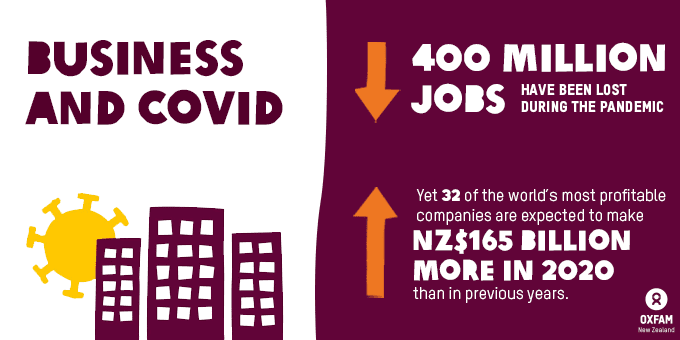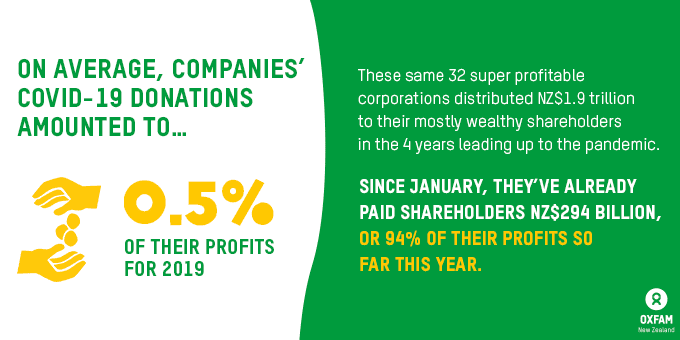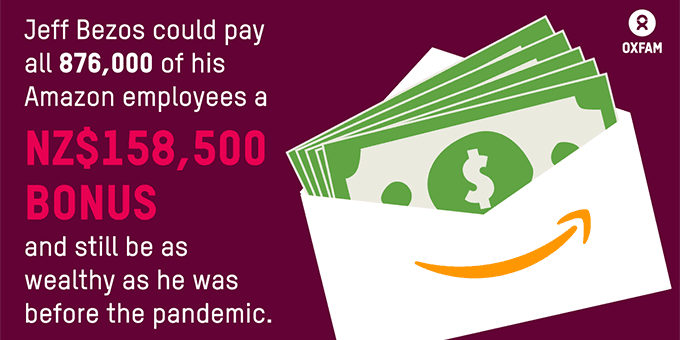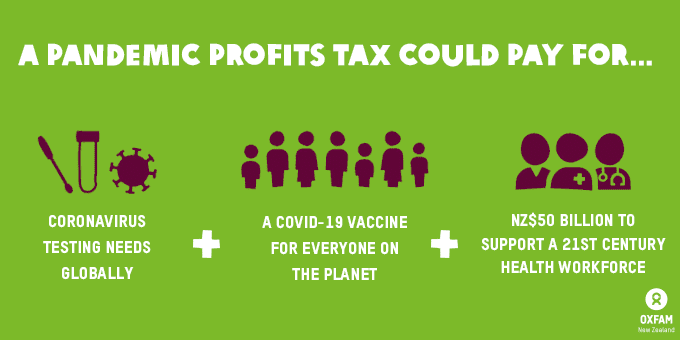Released today, Oxfam’s report – Power, Profits and the Pandemic – reveals how global corporate behaviour has not only made the economic impacts of the coronavirus pandemic worse, but has also shielded many of these corporations from the economic fallout felt by the rest of us. Throughout the disaster, they have continued to profit and pass these gains on to their mostly wealthy shareholders.
Oxfam found that 32 of the world’s most profitable corporations are together expected to rake in nearly NZ$165 billion more in 2020 than the average of the four previous years. These corporations are household names including Visa, Procter & Gamble, Nestle, Johnson & Johnson, Facebook, Google, Microsoft, and Apple.
This isn’t right. How have we managed to build a global economy that puts more and more wealth in the control of a handful of people, while billions of other people suffer? As of this writing, more than 800,000 people have died from Covid-19. Approximately 400 million people, mostly women, have lost their jobs, which impacts entire families. Some estimates have up to 500 million people being pushed into extreme poverty while the pandemic rages on. Meanwhile, the 25 wealthiest billionaires – some of the largest shareholders in the above-mentioned corporations – have increased their wealth by a staggering NZ$340 billion between mid-March and late-May alone.

How did we get here?
1) Corporations made trillions for the few, almost nothing for the many.
Between 2010 and 2019, the companies listed on the S&P 500 Index paid a total of NZ$13.7 trillion to their shareholders – approximately 90% of their profits over that time. While these corporations could have been investing in the well-being of their workers and climate-friendly technologies, they were channelling the vast majority of their profits back into the hands of a small number of already wealthy individuals. If they had been investing more in their businesses, they would have been more resilient in the face of this crisis. They would have had cash on hand to protect their workers, prevent lay-offs, and avoid costly public bail-outs when the coronavirus pandemic hit.
2) Governments have helped, corporations have not.
The pandemic has highlighted the crucial role our governments play in providing for all people, especially in times of crisis. Yet, many of the largest global corporations have done very little to help. They stand to make NZ$165 billion more during 2020 than in the past four years, and some of their largest shareholders increased their collective wealth by an unfathomable NZ$340 billion during the height of the pandemic. Despite this windfall, these companies’ donations to Covid-19 relief have amounted to less than 0.5% of their 2019 profits. In stark contrast, 94% of their 2020 profits have gone back to their already wealthy shareholders.
3) Corporations prioritised their profits over their own people.
Oxfam has found that more than 400 corporations have continued to make shareholder pay-outs and executive compensation despite laying-off workers and receiving government bail-outs. These companies have shifted costs and risks down their supply chains, impacting workers in vulnerable situations.

This situation is not right
It is the result of a broken economy that works for the few, not the many and puts the wealth of a small number of people before the well-being of our planet and billions of people across the world. But we created this economy — we can fix it. We can reprogramme the economy to put people and the planet at the centre, protect workers in the most vulnerable situations, share profits fairly, and ground it in democracy. The way to do this is by focusing on the four Ps: purpose, people, profits and power.
1) Purpose
We should re-examine the purpose of corporations. A corporation’s ‘reason for existence’ is a policy choice, not an inevitability. Corporations should be redefined to ensure that they exist not only to compensate shareholders, but also to care for workers, consumers, and their communities. The objectives of corporations and director’s duties should include non-financial aims, such as improving social and environmental conditions.
2) People
We should put people at the centre of business models, and insist that corporations invest in decent jobs, protect and promote their workers’ human rights, and address human rights risks, and support efforts for universal social protection.
3) Profits
We should ensure that all stakeholders get a fair share of the profits that corporations create. For example, dividends paid out to shareholders should be capped, and only paid out after corporations are paying a living wage to all their workers and investing in achieving carbon neutrality. These measures should also be extended through corporations’ supply chains, which could have a massive impact on people across the entire world.

4) Power
We should change the rules that currently allow global corporations and their shareholders to have vast amounts of power to protect their own interests. This is possible through increased transparency, and more inclusive and equitable governance structures. Governments should require corporations to limit CEO-to-worker wage gaps, disclose human rights risks, enforce human rights due diligence, and publish corporate carbon footprints. Collective bargaining and robust grievance mechanisms should be enforced. And corporations should prioritise suppliers that give greater voice, power and value to workers and farmers.
We can fix this
As a first step, we propose a World War II-style Covid-19 Pandemic Profits Tax to make sure these corporations do their bit to help us all during this global disaster. Oxfam estimates that the excess profits of these 32 global corporations could raise an estimated NZ$157 billion — enough to pay for Covid-19 testing and vaccines for every single individual on the planet. After that, there would still be plenty left over to invest in supporting small and medium-sized enterprises, protecting workers, and providing robust health services for all.

The coronavirus pandemic has shown us how connected we are as a global human family. Global corporations have grown and benefitted from these connections for centuries, but they have not contributed to the global public good in the way that they should. In fact, in many cases, they have done harm. The excess profits the largest corporations are making through a time of great suffering for millions of people across the world exposes the obscenity of the way our global economy has been built. We need to fix this now so that all people, everywhere, can enjoy the basic dignities of life, on a planet that thrives.
To read the report in full click here





